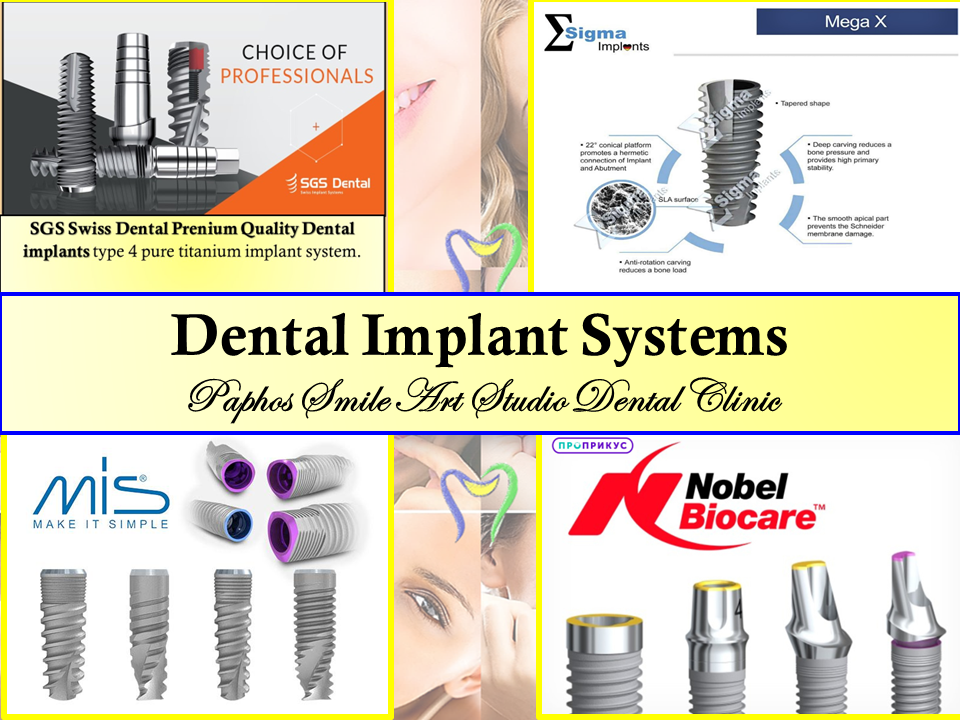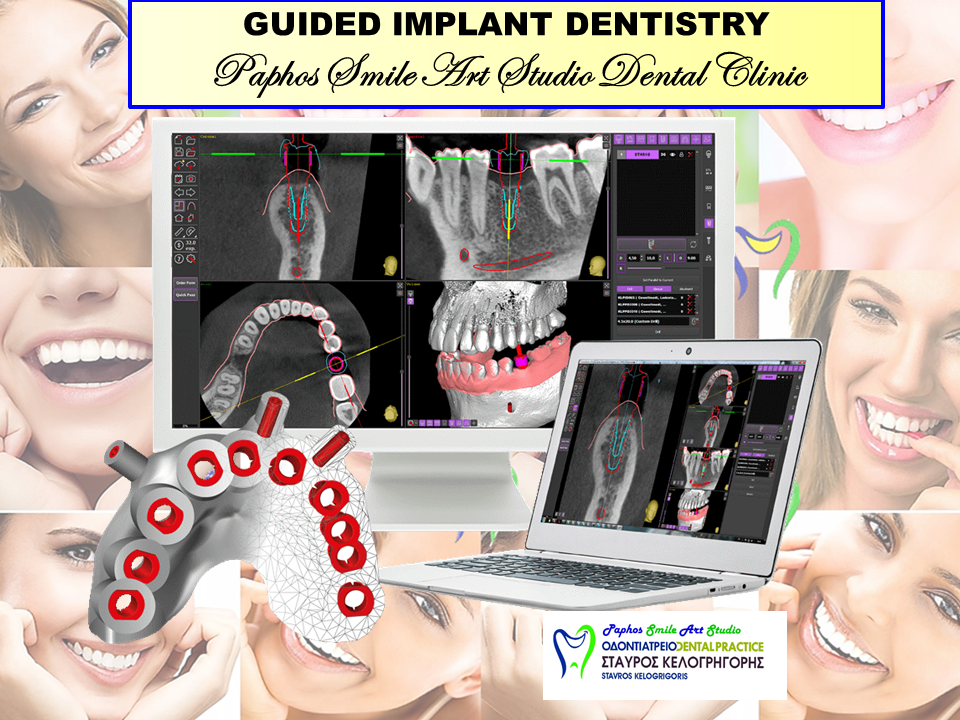What is a Dental Implant?
@dr_skelogrigoris DENTAL IMPLANT @stevekelo ♬ πρωτότυπος ήχος - Dr SK Paphos Dental Clinic
Dental Implants are the new standard of care for treatment of edentulism (missing teeth). If you and your loved ones have lost one tooth, several teeth, or all of their teeth, dental implants are the way to go. Your dentist doesn`t need to grind down one or more teeth so as to fit a dental bridge with the risks of hypersensitivity, fractured of the abutments of the bridge or even necrosis of the pulp of these abutments rather than to place a dental implant. The continuous development of the dental implants reduce their cost approximately at the level of a conventional dental bridge. So why to go for a dental bridge instead of dental implants. Dental implants are the right choice for you.
A Dental Implant is an artificial tooth root that is placed into your jaw to hold a replacement tooth or bridge. Almost all dental implants in use today are made from titanium or titanium alloy, materials that have been shown over many years to be well tolerated by bone. The terms 'osseointegrated implants' or 'endosseous implants' are widely used to describe dental implants that can develop and maintain a close union with bone in order to support replacement teeth. Dental implants may be an option for people who have lost a tooth or teeth due to periodontal disease, an injury, or some other reason.There are many different implant systems available and when competently used they can all deliver a highly reliable form of treatment.
Who is suitable for dental implants?

If you have good general health then dental implants will almost certainly work for you. However, habits such as heavy drinking and smoking can increase the number of problems associated with initial healing and thereafter may negatively influence the long term health of gum and bone surrounding each implant. Remaining teeth might also be compromised making treatment planning less certain.
If you have any other complicated medical problems, please speak to your dentist. We haveconsiderable experience in handling patients with a complicated medical history. It is rare to have health problems that prevent the use of dental implants.
Do I need to have a healthy mouth to have dental implants?
|
When you first enquire about dental implants it is often in response to an awareness of ongoing dental problems or the recent loss of teeth. Each of these problems will need to be diagnosed and treated in a logical manner, often placing implants in order to establish healthier conditions.
Although it is tempting to focus on the more glamorous aspects of teeth supported by implants, basic dental health, which includes the treatment of gum disease, repair of decay and the elimination of abscesses will be just as important for the long term success of your treatment.
If you are aware of bad breath, loose teeth, or have noticed excessive bleeding, particularly when your teeth are cleaned professionally, you may have gum problems. Periodontal (gum) disease is a major cause of bone loss and with reduced bone dental implant treatment can be more complicated. Untreated gum disease is also a risk factor for increased long term implant failure.
How will I know if I am suitable for implants?
During your consultation appointment you will be expected to answer detailed questions concerning your medical history and there will be a complete examination of your mouth and remaining teeth to discover the nature and extent of any current dental problems. If you do not have up to date x-rays of your remaining teeth you may also be required to have new ones taken. Sometimes models and photos will also be needed so that these can be examined after your visit.
How will I know if I have enough bone for dental implants?
Routine dental x-rays show large amounts of detail but in only two dimensions. From these views it is generally possible to judge the height of bone available for implant placement, however, more advanced imaging techniques, such as CT scans, are usually needed to determine the equally important bone width.
Can dental implants preserve bone?
This is one of the most important features of dental implants. Once in place and supporting teeth, everyday functional forces stimulate the surrounding bone which responds by becoming stronger and more dense.
Can dental implants be placed next to natural teeth?
Dental implants are routinely placed beside natural teeth and this is generally very safe to do. The only exception to this would be if the natural root was very curved or tilted unfavourably in the proposed path of the implant. This could cause the root to be damaged by the implant; however this can usually be avoided by careful pre-operative planning.
If a tooth is inadvertently damaged by the placement of a nearby implant, any resulting problems can generally be resolved by root canal treatment in which the nerve of the natural tooth is removed.
What can you do if an implant does not work?
If an implant does not achieve or cannot maintain a rigid fixation with the surrounding bone, it will eventually become loose and no longer be able to support replacement. Commonly the failing implant causes no discomfort and if there are enough remaining, it may not be necessary to replace it at all.
How long does treatment take?
For routine cases, from the time of implant placement to the time of placing the first teeth, treatment times can vary between 6 weeks and 6 months. The availability of better bone can be used to decrease treatment time, whilst more time and care must be taken with poorer bone, which can therefore extend treatment times beyond 6 months.
Can I wear false teeth during implant treatment?
If the teeth being replaced by dental implants are in a clearly visible part of your mouth it is most likely that you will want to have some teeth present whilst the treatment is underway.
There are a number of ways that this can be done, ranging from simple plastic dentures to removable bridges. If replacement teeth are used during treatment stages it is important that they do not apply uncontrolled pressure to the underlying implants.
Is it uncomfortable when the implants are placed?
Most patients will be very familiar with the dental anaesthetics used for routine dentistry and will know how effective they are. Implants are placed using the same anaesthesia. Depending upon the complexity of your case, the operation might take anything from 15 minutes for a single implant, to several hours for complex bone grafting and multiple implant placements.
Since the surgery normally involves exposing the bone in the area where the implant and/or bone graft is to be placed, you can expect some swelling and occasionally bruising afterwards.
For most patients, any of the simple painkillers you might take for a headache will be all that is needed for a few days. If you experience more discomfort than this, do not hesitate to contact your dentist who can prescribe stronger medication.
Healing is generally uneventful and any stitches are removed a week to ten days later. You may also be asked to take a course of antibiotics and to follow some simple procedures such as rinsing with salt water or an antiseptic mouth rinse. It is important that you carry out these instructions.
Is it possible to have a sedation?
Although it is quite straightforward to provide good pain control during surgery, most people will be quite anxious for all but the most simple of implant cases. There is no need to suffer in silence as there are several very effective means by which you can achieve a relaxed state.
Oral sedation:A simple way to aid relaxation is to be given a dose of a short acting medication such as Temezapam (normally used to help with sleep difficulties). This will reduce anxiety for most patients and provides a very good effect for uncomplicated surgical stages taking less than an hour.
Conscious sedation:For treatment of greater complexity it may be suggested that you have a more controlled way of keeping relaxed and comfortable during the surgical stages. This is known as a ‘conscious sedation’ and is distinctly different from a general anaesthetic, because you remain alert enough to respond to simple instructions which may be helpful to the surgeon - however you will remember almost nothing about the treatment stage. For a routine ‘conscious sedation’ a carefully controlled amount of sedative is delivered through a vein in your arm or hand for as long as the treatment takes
What is guided bone regeneration (bone grafting)?
For dental implants to be successful the implant needs to be fully covered in a layer of bone. It is not unusual for there to be insufficient bone available to achieve this, especially at the front of the mouth. In these cases additional bone is placed around the implant at the time of implant insertion. The materials used are of animal origin (normally cow and pig) specially prepared to make them safe for use in humans. The materials form a scaffold, allowing growth of your own bone onto the implant over a period of several months.
How does bone grafting affect the length of treatment?
If you need bone grafting, it will almost invariably increase the length of time your treatment will take, however when successfully applied it will greatly improve the outcome of the implant(s) placed. When used in the front of the mouth it can also allow for creation of much better aesthetics.
Bone grafting requires a considerably higher degree of skill from the operator and is often more complex to perform than the placement of the implant itself.
In certain situations we will recommend combining the implant placement with bone grafting and the placement of a barrier membrane all at the same time. This considerably reduces treatment time and can produce results that are difficult to achieve any other way. However, many surgeons will still prefer to carry out bone grafting as a distinct stage, so that the implants are only placed when the bone grafting has been successful.
Whatever method is chosen to improve the bone quantity, the time, effort and expense is generally well worthwhile.
How long will the implants last?
Implants in their current form have only been available for twenty years so long term data is limited; however, the latest research shows very good results.
Once the implants and surrounding soft tissues are seen to be healthy and the new teeth comfortable and correctly adjusted, it is the quality of your home care and willingness to present for regular maintenance reviews that will have most influence on how long they will last.When poorly cared for, implants will develop a covering of hard and soft deposits (calculus and plaque) which is very similar to that found on neglected natural teeth. Untreated, these deposits can lead to gum infection, bleeding, soreness and general discomfort, just as can occur around natural teeth (peri-mucositis). This can progress to loss of bone around the implant (peria implantitis). It could probably be said that implants, much like teeth, will last for as long as you can keep them clean.
Which patients can expect a higher level of implant failure?
Certain groups of patients experience a higher level of implant failure, both in the short and long term. These include smokers, heavy drinkers, poorly controlled diabetic, those with a history of advanced gum disease, those with very heavy bites (bruxers) and those who don’t maintain a high level of oral health.
How do I look after the implants?
For most implant-supported teeth you will be able to clean around each supporting implant by brushing and flossing in just the same way that you would around natural teeth and toothb supported bridges. In some areas special floss, interdental toothbrushes, Tepe brushes and other cleaning aids may be needed to maintain good oral hygiene. Cleaning is not at all difficult, provided that you do not have impaired use of your hands.
It is reasonable to expect some of the daily hygiene procedures to be a little more complex than around your original teeth - equally expect to spend more time than you may have done in the past if you wish to maintain optimum implant health.
For the first few months that the implants are in function your dentist may ask that you are seen more frequently. However, once they are satisfied your treatment is performing as planned, ongoing care will be similar to any patient with natural teeth.
What is Guided Implant Surgery?
@dr_skelogrigoris ALL ON X FULL ARCH REHABILITATION @paphossmileart ♬ original sound - Dr SK Paphos Dental Clinic
Guided implant surgery is a modern method of installing dental implants in patients who are missing teeth, or have just had a tooth removed. It uses computers to scan the patient’s mouth and create a 3D model, which allows the dentist to plan the optimum procedure before carrying it out. Without the guided approach, some guesswork is needed to choose the part of the jawbone the dentist will use to place the implant; with the 3D model, the dentist knows before going in.
Guided dental implant surgery is when the dentist utilizes advanced machinery and imaging technology to “guide” or aid them to manufacture and place dental implants more efficiently, precisely and accurately. Computer guided implant surgery is significantly quicker, oftentimes resulting in the patient getting his or her new teeth on a single dental office visit. This new and improved dental implant surgery allows the dentist to have a more complete picture of the patient’s mouth and accurately produce the most appropriate dental implants. These steps that use to require many dental office visits can now be performed on the same day, concluding with the surgery. In one day, a patient can have new teeth and a renewed smile.
If you are missing a tooth, or have a broken or damaged tooth that needs to be removed, a dental implant is often the best solution, as it doesn’t involve your other teeth. It is important that an implant looks and feels natural, and to achieve this, the placement must be perfect. While skilled dentists can carry out an implant procedure to produce an aesthetically-pleasing result without the aid of a computer, guided implant surgery reduces the risk of human error significantly, by planning the safest, most efficient procedure, with the best-looking result. Moreover, guided surgery also allows the dentist to superimpose abutments and plan how much space will be needed for the crown and any other structure that will be added. The biggest advantage for many dentists who perform guided implant surgery is safety.
Especially if you need full rehabilitation of the mouth with 8-12 dental implants the guided implant surgery is the safest quickest and more accurate treatment method for these complex treatment which is simplifying the whole surgical procedure.
What are the advantages of computer guided implant surgery?
Precise planning
The dentist can visualize the patient’s mouth structure and jaw bone. This allows accurate planning together with the patient.
Reduce surgical time.
Increase accuracy of implant position
Less invasive, shorter recovery time
Look, feel and function like natural teeth
Worry-free
The first step is to conduct an oral exam of the patient to assess that implants are a suitable treatment. The patient’s mouth first needs to be scanned, using a dental CBCT and 3D imaging techniques to assemble 2D images into a 3D digital model. A CBCT scan captures important information, such as the position of nerves, sinuses, and other anatomical points of reference. The dentist then uses this model to plan the procedure.
They will create a surgical guide, which is used to place the implant. After this a crown is placed, resulting in a natural-looking tooth. Due to the precise planning before the surgery, the implant procedure is usually completed very quickly and efficiently.
Guided implant surgery is becoming more and more common in dental practices, and the use of CBCT scans, computers and CAD/CAM technology is thought by some to be the future of dental implant procedure.
What implant systems Paphos Smile Art Studio Paphos Dental Clinic has?

In our Dental Clinic our aim is to provide our patient the best implant systems in the market at an affordable price.So we have 4 implant systems flr paients to choose in different prices.
a) The prestigious and pioneer in the field of oral implantology Nobel Biocare with the best quality pure titanium dental implants in the market and a versatile implant system that can treat the most difficult cases.
b)The innovative and very versatile implant system switched platform dental implant MEGAX from Sigma from Germany at an affortable and very good price.
c)The excellent quality and best price dental implant system MIS from Israel.
d)One of the best and revolutionary dental implant in the dental market with excellent swiss quality surface SGS Dental Implant Systems from Switzerland an especially the switced platform P7D dental implant.
.jpg)
